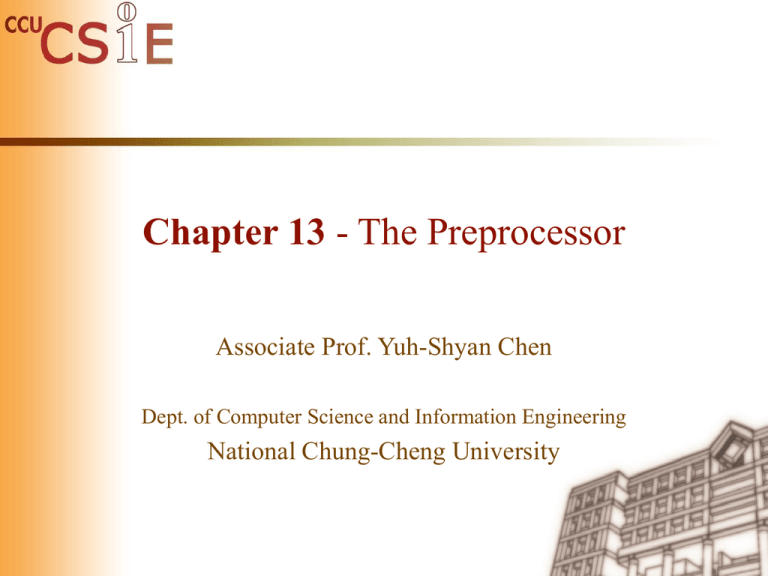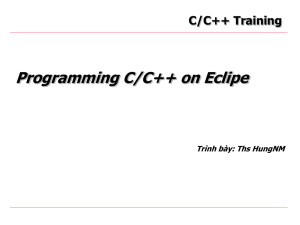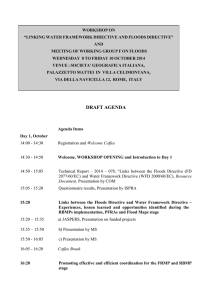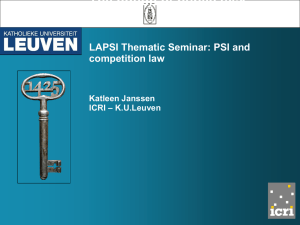13.4 The #define Preprocessor Directive
advertisement

Chapter 13 - The Preprocessor
Associate Prof. Yuh-Shyan Chen
Dept. of Computer Science and Information Engineering
National Chung-Cheng University
Outline
13.1
13.2
13.3
13.4
13.5
13.6
13.7
13.8
13.9
13.10
Introduction
The #include Preprocessor Directive
The #define Preprocessor Directive: Symbolic
Constants
The #define Preprocessor Directive: Macros
Conditional Compilation
The #error and #pragma Preprocessor Directives
The # and ## Operators
Line Numbers
Predefined Symbolic Constants
Assertions
13.1 Introduction
Preprocessing
Occurs before a program is compiled
Inclusion of other files
Definition of symbolic constants and macros
Conditional compilation of program code
Conditional execution of preprocessor directives
Format of preprocessor directives
Lines begin with #
Only whitespace characters before directives on a line
13.2 The #include Preprocessor Directive
#include
Copy of a specified file included in place of the directive
#include <filename> Searches standard library for file
Use for standard library files
#include "filename"
Use for user-defined files
Used for
Searches current directory, then standard library
Loading header files (#include <iostream>)
Programs with multiple source files to be compiled together
Header file - has common declarations and definitions (classes, structures, function
prototypes)
#include statement in each file
13.3 The #define Preprocessor Directive:
Symbolic Constants
#define
Preprocessor directive used to create symbolic constants and
macros.
Symbolic constants
When program compiled, all occurrences of symbolic constant
replaced with replacement text
Format
#define identifier replacement-text
Example: #define PI 3.14159
everything to right of identifier replaces text
#define PI = 3.14159
replaces "PI" with " = 3.14159", probably results in an error
Cannot redefine symbolic constants with more #define
statements
13.4 The #define Preprocessor Directive:
Macros
Macro
Operation defined in #define
Macro without arguments: treated like a symbolic
constant
Macro with arguments: arguments substituted for
replacement text, macro expanded
Performs a text substitution - no data type checking
Example:
#define CIRCLE_AREA( x ) ( (PI) * ( x ) * ( x ) )
area = CIRCLE_AREA( 4 );
is expanded to
area = ( 3.14159 * ( 4 ) * ( 4 ) );
13.4 The #define Preprocessor Directive:
Macros
Use parenthesis
Without them:
#define CIRCLE_AREA( x ) ((PI) * ( x ) * ( x ))
#define CIRCLE_AREA( x ) PI * x * x
area = CIRCLE_AREA( c + 2 );
becomes
area = 3.14159 * c + 2 * c + 2;
Evaluates incorrectly
Macor’s advantage is that avoiding function overhead
Macro inserts code directly.
Macro’s disadvantage is that its argument may be evaluated
more than once.
double circleArea ( double x )
{
return 3.1415926 * x * x ;
}
13.4 The #define Preprocessor Directive:
Macros
Multiple arguments
#define RECTANGLE_AREA( x, y )
( y ) )
( ( x ) *
rectArea = RECTANGLE_AREA( a + 4, b + 7 );
becomes
rectArea = ( ( a + 4 ) * ( b + 7 ) );
13.4 The #define Preprocessor Directive:
Macros
#undef
Undefines a symbolic constant or macro, which
can later be redefined
#define getchar() getc ( stdin )
13.5 Conditional Compilation
Conditional compilation
Control preprocessor directives and compilation
Cast expressions, sizeof, enumeration constants cannot
be evaluated
Structure similar to if
#if !defined( NULL )
#define NULL 0
#endif
Determines if symbolic constant NULL defined
If NULL is defined, defined(NULL) evaluates to 1
If NULL not defined, defines NULL as 0
Every #if ends with #endif
#ifdef short for #if defined(name)
#ifndef short for #if !defined(name)
13.5 Conditional Compilation (II)
Other statements
#elif - equivalent of else if in an if structure
#else - equivalent of else in an if structure
"Comment out" code
Cannot use /* ... */
Use /* to prevent it from being compiled */
#if 0
code commented out
#endif
to enable code, change 0 to 1
13.5 Conditional Compilation (III)
Debugging
#define DEBUG 1
#ifdef DEBUG
printf (“ Variable x = %d \n”, x) ;
#endif
Defining DEBUG enables code
After code corrected, remove #define statement
Debugging statements are now ignored
13.7 The # and ## Operators
#
Replacement text token converted to string with quotes
#define HELLO( x ) printf (“ Hello, “ #x “\n”);
HELLO(John)
becomes
printf (“ Hello, “ “John” “\n”);
printf (“ Hello, John\n”);
##
Concatenates two tokens
Strings separated by whitespace are concatenated
#define TOKENCONCAT( x, y ) x ## y
TOKENCONCAT( O, K )
becomes
OK
Notice #
13.10
Assertions
assert macro
Header <assert.h>
Tests value of an expression
If 0 (false) prints error message and calls abort
assert( x <= 10 );
If NDEBUG defined...
All subsequent assert statements ignored
#define NDEBUG





